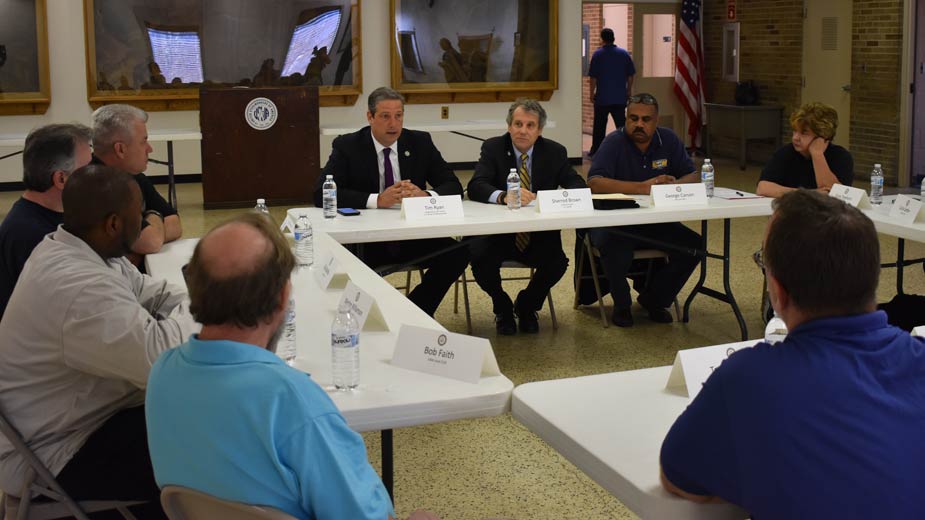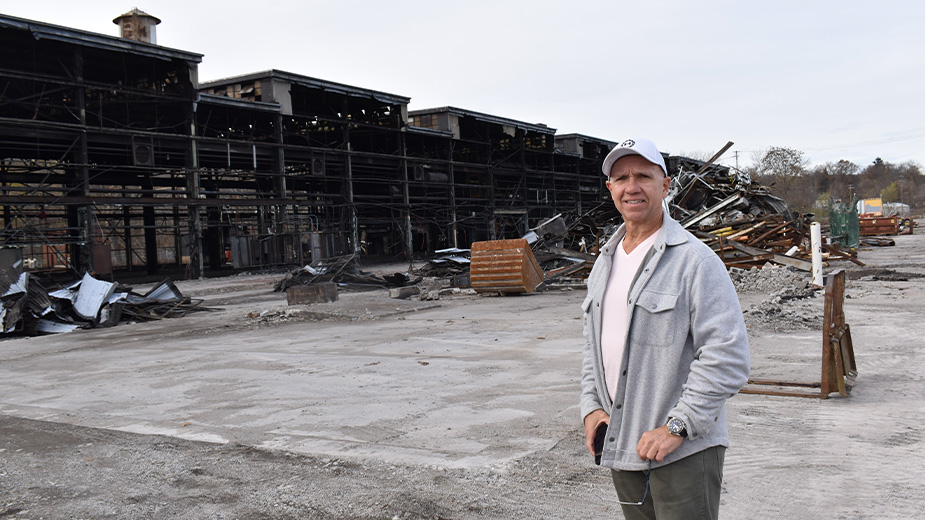Brown, Ryan, Workers Want Trump to Protect Jobs
WARREN, Ohio – U.S. legislators and local labor representatives agree they must keep pressure on President Trump to uphold his campaign promises to protect steel and steel-related jobs.
U.S. Sen. Sherrod Brown, D-Ohio, and U.S. Rep. Tim Ryan, D-13 Ohio, conducted a roundtable Monday with a dozen northeastern Ohio steelworkers at the United Steel Workers Local 1375 hall to discuss the state of the industry and efforts to preserve jobs.
“We’ve got to hold the president’s feet to the fire,” Ryan said. ”He made a lot of promises during the election about a lot of things. We know that these trade issues are essential and so our job is to make sure what he said during the course of the campaign he delivers on.
“If he does try to deliver on them, we’ll be there to try to help him. But of now, we’ve got to fight,” he continued.
George Carson, president of Steelworkers Local 612, which represents hourly workers at Comprehensive Logistics in Austintown, complained that both Democratic and Republican presidents have pushed international trade deals with the promise that they would benefit the American worker.
“We’re not seeing it quick enough. We’re just not seeing it happen,” he remarked. The rank and file are seeing more jobs lost, he added, first in steel and now in the auto industry.
The company is part of the supply chain for the General Motors Lordstown Complex.
“We need to tighten up trade. We need to tighten up currency manipulation. We need to get better on these trade deals,” said Richard Sayers, president of Steelworkers Local 1375.
Although Brown said reports that China is beginning to roll back some of its steel capacity is a step in the right direction, he faulted Trump for his failure to designate China as a currency manipulator as he had repeatedly promised during his campaign for president.
One of the biggest problems for American jobs – particularly in steel, and subsequently for jobs that rely on U.S. steel – is that China has the capacity to produce half the world supply of steel, Brown said.
“They’ve been dumping steel and cheating, as have the South Koreans for years,” he continued. “That’s why an aggressive trade policy of enforcement matters. I’m hopeful that China’s actions this week are going to matter.”
Brown praised Commerce Secretary Wilbur Ross as “a good guy on steel” and called Robert Lighthizer, Trump’s nominee for U.S. trade representative, as “maybe the best appointee in the administration.”
In Niles, about a third of Arconic’s business is with the military. The biggest trade issue for the titanium mill is foreign producers that seeking waivers under the Berry Amendment, says Terry Thierion of Steelworkers Local 2155, which represents hourly workers there.
The Berry Amendment restricts the use of Department of Defense funds to procure certain goods – including specialty metals such as titanium — “not grown, reprocessed, reused or produced” domestically, according to the U.S. International Trade Administration’s website.
Both Russia and China “produce titanium like crazy” and “flood the markets,” Thierion said.
“We’re able to produce [titanium] as well as or better than they are at a cheaper cost,” he said. “But when China floods the market, it makes it very difficult for you to compete.”
Steelworkers Local 2243’s James Walker, of Ohio Star Forge in Champion, which forges automotive parts from high-strength steel, sees steel arrive at his plant from all over the world, he said.
“Our customers dictate what product they want their product forged from,” he said. According to his company’s CEO, he told Brown and Ryan, if Ohio Star doesn’t forge it, a competitor will.
He also asked why the United States trades with counties that subsidize their companies and pay poverty-level wages.
“To me that’s not trade. When you and I trade, you and I are swapping something of equal values,” he stated.
“When container ships come here constantly and go home empty, that’s not trade,” he declared. “That’s a gift. We’re gifting them our work and they’re gifting us with unemployment.”
The country has yet to deal with the issue of globalization, which “works in the aggregate” but damages communities like the Mahoning Valley, Ryan said.
“The pain is deep here for a lot of workers,” he said. “There is still no real plan from the administration on how to deal with this. That’s the biggest issue: a lot of rhetoric but not a plan.”
Copyright 2024 The Business Journal, Youngstown, Ohio.



